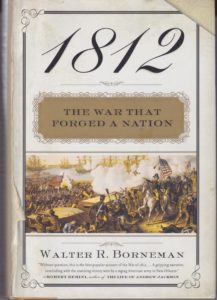This afternoon at 2:00 we celebrate the life and death of James Hicks Gee. Mr. Gee served as a musician playing the fife during the Battle of New Orleans. Born in Virginia, he answered the call for volunteers in the Tennessee Militia in the fall of 1814. Only 15 years old at the time, he gallantly served the United States in a war that is often misunderstood. Please join us for the service at East Mount Cemetery in Greenville.
When asked to say a few words at the ceremony for Mr. Gee, I realized I knew very little about the War of 1812. Most of what I knew came from Johnny Horton hit song, “The Battle of New Orleans.” Not a great source to say the least. I found 1812: the War That Forged a Nation by Walter R. Borneman on my bookshelf and decided to give it a try. Someone gave it to me for Christmas in 2004 and now was the time to read it. It was just what I needed.
We often think we know the simple cause of a war, but it is much more difficult. There are always so many different causes, so many different viewpoints, and so much propaganda involved with any conflict. The War of 1812 was no exception.
Probably the foremost reason was the impressment of United States sailors on our ships, on merchant ships, and other vessels on any sea. Great Britain controlled all shipping and all seas and therefore claimed that the strength of her empire depended on taking able-bodied men from any ship they boarded.
Two rights the British claimed absolutely galled the U. S. The first was impressment and the second was Right of Deposit. That meant that pioneers west of the Appalachians could lose the right to use the port of New Orleans to store and export farm products and other goods to the rest of the world.
One reason for the Louisiana Purchase in 1803 was to guarantee settlers land rights between the Appalachians and the Mississippi River and the right to use the port at New Orleans freely. By 1807 Great Britain was showing signs of repealing that right, even though the British had no control of New Orleans.
Add to these insults from Great Britain were the War Hawks, Congressional representatives from the territories and states adjacent to the Great Lakes who wanted to conquer Canada for the United States. After two or three tries, it became evident that was not to be something the U. S. gained. Then there was Andrew Jackson and Sam Houston who attempted to subdue the Creek Indians in Alabama.
The two nations met in Ghent, today a part of Belgium, and agreed to a treaty that must be signed by rulers of both countries. The British signed on December 28, 1814 but the document did not reach Washington for some time. Part of the treaty was status ante bellum, a term meaning all territory captured before the end of the war went to the victor.
The Battle of New Orleans was fought during most of the month of January 1815; with the result that the U. S. claimed New Orleans at the time the U. S. Senate ratified the treaty. The United States became a full-fledged nation of the world as a result. It was the beginning of our greatness.


I believe I noticed the cemetery which I call East Mount referred to as East Mound in the obit for Lallie P Briscoe. Was/Is there confusion about the proper name? Just curious.